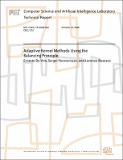| dc.contributor.advisor | Tomaso Poggio | |
| dc.contributor.author | Rosasco, Lorenzo | en_US |
| dc.contributor.author | Pereverzyev, Sergei | en_US |
| dc.contributor.author | De Vito, Ernesto | en_US |
| dc.contributor.other | Center for Biological and Computational Learning (CBCL) | en_US |
| dc.date.accessioned | 2008-10-17T15:30:10Z | |
| dc.date.available | 2008-10-17T15:30:10Z | |
| dc.date.issued | 2008-10-16 | |
| dc.identifier.uri | http://hdl.handle.net/1721.1/42896 | |
| dc.description.abstract | The regularization parameter choice is a fundamental problem in supervised learning since the performance of most algorithms crucially depends on the choice of one or more of such parameters. In particular a main theoretical issue regards the amount of prior knowledge on the problem needed to suitably choose the regularization parameter and obtain learning rates. In this paper we present a strategy, the balancing principle, to choose the regularization parameter without knowledge of the regularity of the target function. Such a choice adaptively achieves the best error rate. Our main result applies to regularization algorithms in reproducing kernel Hilbert space with the square loss, though we also study how a similar principle can be used in other situations. As a straightforward corollary we can immediately derive adaptive parameter choice for various kernel methods recently studied. Numerical experiments with the proposed parameter choice rules are also presented. | en_US |
| dc.format.extent | 24 p. | en_US |
| dc.relation.ispartofseries | MIT-CSAIL-TR-2008-062 | |
| dc.relation.ispartofseries | CBCL-275 | |
| dc.subject | Adaptive Model Selection | en_US |
| dc.subject | Learning Theory | en_US |
| dc.subject | Inverse Problems | en_US |
| dc.subject | Regularization | en_US |
| dc.title | Adaptive Kernel Methods Using the Balancing Principle | en_US |
